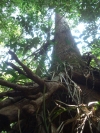 Indonesian paper firm Asia Pulp and Paper (APP) released a document aimed to counter environmentalists critics to the company. According to the document, since 1996 APP has only been developing degraded or low conservation-value areas, but does not provide definitions of these terms. It also states that the net carbon of its paper is close to zero given carbon sequestration of its plantations. However, the analysis of its carbon had ignored the emissions caused by the large volumes of tropical timber APP uses for its pulp production and, most of all, the vast emissions the drainage of the company's plantations on peat cause. In an accounting maneuver, had also added the minor carbon sequestration of the very plantations that cause the emissions from peat degradation to reach APP's goal of a "near zero" footprint.
Indonesian paper firm Asia Pulp and Paper (APP) released a document aimed to counter environmentalists critics to the company. According to the document, since 1996 APP has only been developing degraded or low conservation-value areas, but does not provide definitions of these terms. It also states that the net carbon of its paper is close to zero given carbon sequestration of its plantations. However, the analysis of its carbon had ignored the emissions caused by the large volumes of tropical timber APP uses for its pulp production and, most of all, the vast emissions the drainage of the company's plantations on peat cause. In an accounting maneuver, had also added the minor carbon sequestration of the very plantations that cause the emissions from peat degradation to reach APP's goal of a "near zero" footprint.
"'Getting the Facts Down on Paper' refutes and rejects the fictitious and misleading accusations made by certain NGOs. The verification report by Mazars provides us and the public with hard evidence that APP is following a rigorously planned and implemented sustainability path."
The "certain NGOs is referred to a letter of 40 major European NGOs asking to paper buyers to avoid APP products, for their links to rainforests destruction in Indonesia.
"The audit demonstrates to the public - without question - APP's absolute commitment to transparency and sustainability," Aida Greenbury, APP's director for sustainability and stakeholder engagement, told the Jakarta Post.
"This is not an audit, it's just greenwashing - said Sergio Baffoni, of Terra! - APP is launching an aggressive market campaign to expand its business in Europe, and is trying to present its operation as sustainable. The fact is that an expansion of its markets will lead inevitably to further conversion of tropical forests and peatlands. For this reason, NGOs from Italy, France, Germany, United Kingdom, Spain, Austria, Belgium, The Netherlands, Portugal, Malta, Finland, Sweden and Switzerland joined to demand to paper industry to adopt a responsible paper procurement policy".
"[The report] is not worth the paper it's written on. It is long on hype and conjecture and short on fact - added Bustar of Greenpeace- The reality is that APP continues to trash Sumatran rainforests, including tiger habitat, and to destroy carbon rich peatlands".
Satellites images have been capturing and documenting every single hectare that the company has destroyed for years, explains Aditya, of WWF: "There is no place to hide for Sinar Mas APP: its devastation of the country's natural forest is clear and present and for everybody to see. After pulping more than a million hectares of Indonesia's forests since it first opened its Indah Kiat mill in Riau, Sumatra, APP applied for and plans to clear yet another 100,000 hectares of natural forest in 2009 and 2010. 100,000 hectare today and 1,000,000 hectare yesterday cannot be hidden. These areas and the forests that were once there have been verified on satellite images, through aerial surveys and field visits many times".
Permit applications and satellite images show that until today SMG/APP has been targeting dense forests with high biodiversity, including Sumatran tiger, elephants, and orangutans that are often the home of indigenous peoples. APP has eradicated over a million hectares of tiger habitat already with its deforestation campaign in central Sumatra while applauding itself for contributing 15,025 ha to the Senepis Tiger Sanctuary in Riau. But even in that area, most had already been protected for tigers by government zoning.
Actually, even the "certifying" company, Mazars, distanced itself from its "assurance report" for SMG/APP even in its cover letter explaining that the "Board of Directors of the [Sinar Mas and APP] Companies [who hired Mazars] are responsible for both the subject matter and the evaluation criteria." No published NGO report on SMG/APP operations was referenced in the APP's audited CSR report, therefore not verified by Mazars. There is not much to "audit" in the APP document, since it doesn't provides facts on its forestry practices, such as clearing forests and peatland, threatening tiger and orang-utan habitat, and conflicting with forest communities. The APP 'certified' document is mostly focused in denying World Bank figures on Indonesian carbon print, and in presenting some conservation project sponsored by the company, while destroying massively the forest habitats. The public is thus provided with nothing but a cover letter on an unpublished "assurance report" about documents that are not made available to public.
A similar "certified" document was produced by Sinar Mas, APP mother company, to prove its sustainability. The document was easily belies by Greenpeace with some photo evidences.
{youtube}kCISa0GXKfk{/youtube}


